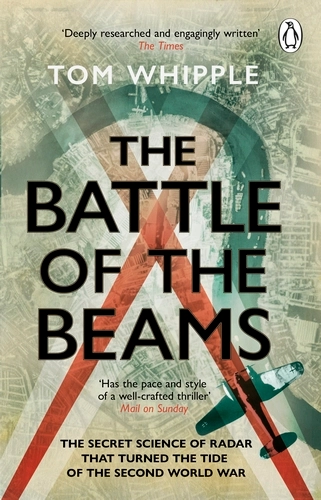 Well this is a treat! It is rare to find a pop-science book which does such a good job of actually explaining the science, rather than just using it as a background for storytelling. The Battle of Beams doesn't go too deep into the mechanics and physics, but gives a general overview with just enough detail to keep things interesting. It is also well illustrated (not a given in these sorts of books) which helps flesh out some of the trickier concepts.
Well this is a treat! It is rare to find a pop-science book which does such a good job of actually explaining the science, rather than just using it as a background for storytelling. The Battle of Beams doesn't go too deep into the mechanics and physics, but gives a general overview with just enough detail to keep things interesting. It is also well illustrated (not a given in these sorts of books) which helps flesh out some of the trickier concepts.
How did radio-waves change the course of the war? Was RADAR solely the preserve of the British? What tactics were used to conceal developments? Was there an invisible war in the skies? Battle of the Beams takes a technical and social look at how physics became the forefront of attack and defence. It dives into the people who set their brains to work on the problem, and those who were determined to stop them.
The book honest about the problems of referencing contradictory source material. Some of the work published after the war is obviously biased towards the writer's personal successes - which don't always tally with reality. Similarly, there's a good overview of what both sides were doing in technology. We often only hear about ENIGMA and Britain's attempts to crack it - it's rare to read something from the other side. Here we get to experience both sides as they attempt to tame the radio waves, discover how they are being used against them, and the countermeasures both sides took.
The book is pacey and leaps back-and-forth across the channel, giving a real sense of drama to the sometimes baroque nature of physics research. There is a little touch of the "boys-own-adventure" what with daring fighter pilots and exciting raids - but it never strays into the hagiographic.
As ever with histories of the second World War, you're left wondering how it was the Allies succeeded. The book is full of infuriating little anecdotes like:
The report was filed and then forgotten, seen by some officials, understood by fewer, and then left in the archives of Whitehall. Britain continued for at least a year to believe that it, alone, had mastered this new wonder weapon of radar.
Similarly, a daring piece of espionage was fatally undermined when the defector was imprisoned and then:
through an astonishing cock-up the film he had gone to so much trouble to smuggle in had been sent to be processed at the post office, and most of it had been destroyed.
Gah!
Nevertheless, a fascinating look at how technology develops and how systems react to change.